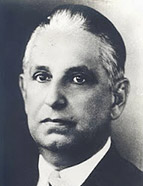

A Brazilian historian, born on 19 March 1890 in Santo Amaro, in the state of Bahia, and passed away on 07 October 1967 in the city of Rio de Janeiro. A descendant of a traditional Recôncavo family, he was the son of Dr. José Ferreira de Araújo Pinho, who served as a deputy in the Assembléia Geral do Império [General Assembly of the Empire] and later as governor of Bahia during the Republican regime. His maternal grandfather was João Maurício Wanderley, the Baron of Cotegipe (1815-1889), a prominent statesman of the Second Reign.
He graduated in Legal and Social Sciences from the Law Faculty of Bahia, practised as a lawyer, and held several positions within the judiciary. He entered politics, serving as a federal member of parliament in successive legislatures (1924-1930), and became mayor of the city of Salvador during the administration of Otávio Mangabeira (1947-1951). He conceived and organised the celebrations for the 400th anniversary of the founding of Bahia's capital in 1949. The highlight of the festivities was the "Four Centuries Historical Parade", an event closely resembling the "Portuguese World Parade," held a few years earlier during the Portugal's Centenary Celebrations (1940). In the festivities in Salvador, as in all his work, his positive perception of Portuguese colonisation shines through, unlike other scholars of the time who condemned the Lusitanian socio-cultural matrix in the formation of Brazilian identity. It is worth noting that Wanderley Pinho contributed to the collection published by the Agência Geral das Colônias [General Agency for the Colonies] in 1940, commemorating the double centenary of Portugal's foundation and restoration, with the biography D. Marcos Teixeira, quinto bispo do Brasil [D. Marcos Teixeira, fifth bishop of Brazil]. In addition to his political activities, he dedicated himself to historical research and teaching at the university level. He served as a full professor of Brazilian history at the Federal University of Bahia and was a member of the Instituto Histórico e Geográfico Brasileiro [Brazilian Historic and Geographic Institute], the Instituto Geográfico e Histórico da Bahia [Geographical and Historical Institute of Bahia], and the Academia de Letras da Bahia [Bahian Academy of Letters].
This work is financed by national funds through FCT - Foundation for Science and Technology, I.P, in the scope of the projects UIDB/04311/2020 and UIDP/04311/2020.
